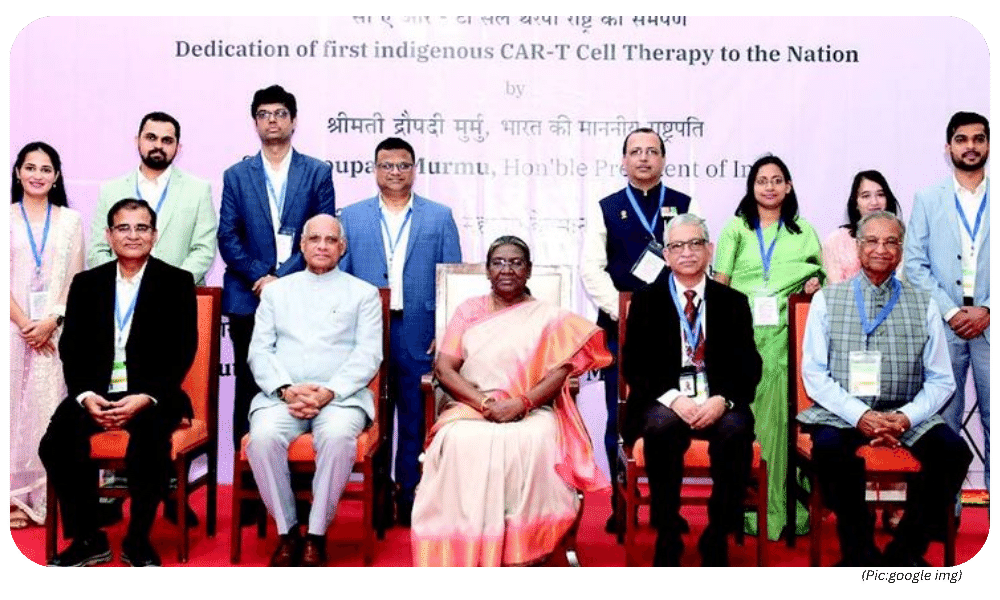Summary:
-
- Breakthrough in Cancer Treatment: India’s President, Droupadi Murmu, launched the country’s first indigenous CAR-T cell therapy, NexCAR19, in April 2024.
- Collaborative Effort: Developed by IIT Bombay and Tata Memorial Centre, NexCAR19 uses genetically modified T-cells to target cancer cells.
- Significance: NexCAR19 promises to make CAR-T cell therapy more accessible and affordable in India, showcasing significant medical advancement.
What is the news?
-
- A significant breakthrough in cancer treatment emerged on April 2024, when the President of India, Droupadi Murmu, launched India’s first indigenously developed CAR-T cell therapy for cancer.
Where the launch ceremony took place?
-
- The launch ceremony took place at the Indian Institute of Technology (IIT) Bombay, marking a momentous occasion for the Indian healthcare sector and cancer patients.
-
- This innovative therapy, named NexCAR19, is a result of a collaborative effort between researchers at IIT Bombay’s Department of Biosciences and Bioengineering, led by Prof. Rahul Purwar, his students who co-founded the startup ImmunoACT, and doctors at the esteemed Tata Memorial Centre in Mumbai. NexCAR19 utilizes genetically modified T-cells, a type of white blood cell, to target and destroy cancer cells.
Understanding Chimeric Antigen Receptor (CAR)-T Cell Therapy:
-
- CAR-T cell therapy is a personalized immunotherapy approach that utilizes a patient’s own immune system to combat cancer. T cells, a type of white blood cell crucial for fighting infections, are extracted from the patient, genetically modified to recognize and target specific cancer cells, and then reintroduced into the body. These engineered T cells, known as CAR-T cells, can then effectively attack and destroy cancerous cells.
Why: The development of this indigenous CAR-T cell therapy holds immense significance for several reasons:
-
- Accessibility: Previously, CAR-T cell therapy options were only available abroad and came at a prohibitive cost. NexCAR19, being developed in India, is expected to be significantly more affordable, making this life-saving treatment accessible to a wider range of cancer patients in India.
-
- Medical Advancement: The successful development of NexCAR19 marks a major leap forward in India’s medical research and development capabilities. It demonstrates the country’s growing expertise in the field of cell and gene therapy, potentially paving the way for further advancements in cancer treatment.
-
- Hope for Patients: For many cancer patients, traditional treatment options may not be effective or have debilitating side effects. CAR-T cell therapy offers a new ray of hope, potentially leading to remission or longer lifespans for patients with specific types of cancer.
Challenges and the Road Ahead:
While the launch of NexCAR19 is a cause for celebration, some challenges remain:
-
- Large-Scale Production: Ensuring efficient and large-scale production of NexCAR19 is crucial to make it widely available to patients.
-
- Clinical Trials: Further clinical trials are likely needed to fully establish the long-term efficacy and safety of NexCAR19.
-
- Medical Infrastructure: The widespread adoption of CAR-T cell therapy might require upgrades to medical infrastructure to ensure proper patient care and treatment delivery.
Conclusion:
-
- The launch of India’s first indigenous CAR-T cell therapy signifies a new era in cancer treatment within the country. By addressing existing challenges and fostering continued research, NexCAR19 has the potential to transform the lives of countless cancer patients in India and beyond.
QuizTime:
0 votes, 0 avg
0
Mains Questions:

Question 1:
The President of India recently launched the country’s first indigenous Chimeric Antigen Receptor T-cell (CAR-T) cell therapy for cancer. Explain the concept of CAR-T cell therapy and discuss the significance of India developing its own CAR-T cell therapy. Analyze the challenges that need to be addressed for this therapy to become widely available to cancer patients in India.(250 words)
Model Answer:
CAR-T Cell Therapy:
-
- CAR-T cell therapy is a personalized immunotherapy approach that utilizes a patient’s own immune system to fight cancer. T cells are extracted from the patient, genetically modified with a Chimeric Antigen Receptor (CAR) to recognize specific cancer cells, and then reintroduced into the body. These engineered CAR-T cells can then effectively attack and destroy cancerous cells.
Significance of Indigenous CAR-T Cell Therapy:
-
- Accessibility and Affordability: Previously, CAR-T cell therapy was only available abroad at high costs. This indigenous therapy has the potential to significantly reduce treatment costs.
- Scientific Advancement: It showcases India’s growing expertise in biotechnology and personalized medicine, paving the way for further research and development of advanced cancer therapies.
- Boosting Medical Infrastructure: It strengthens India’s healthcare infrastructure and its ability to provide cutting-edge cancer treatment options.
Challenges:
-
- Manufacturing and Scalability: Ensuring large-scale production and maintaining high quality standards for CAR-T cell therapy is crucial.
- Clinical Trials and Regulation: Further clinical trials and regulatory approvals may be needed before wide availability.
- Doctor Training and Infrastructure: Specialized training for healthcare professionals and proper infrastructure for administering this therapy are essential.
Question 2:
Discuss the potential impact of India’s first indigenous CAR-T cell therapy on the country’s healthcare system and suggest measures to ensure equitable access to this therapy for cancer patients.(250 words)
Model Answer:
Potential Impact:
-
- Improved Cancer Treatment Outcomes: CAR-T cell therapy offers a potentially life-saving treatment option for some cancer patients.
- Reduced Reliance on Foreign Treatments: Indigenous development reduces reliance on expensive foreign therapies.
- Boost for Medical Research and Innovation: This success can encourage further research and development in advanced cancer therapies in India.
Measures for Equitable Access:
-
- Government Support: Government initiatives can help reduce treatment costs and make it more affordable for patients.
- Insurance Coverage: Inclusion of CAR-T cell therapy in health insurance schemes can improve accessibility.
- Public Awareness Campaigns: Raising awareness about this therapy can empower patients to seek treatment options.
By addressing these challenges and promoting equitable access, India can ensure that this groundbreaking therapy reaches the patients who need it most, significantly impacting the country’s fight against cancer.
Remember: These are just sample answers. It’s important to further research and refine your responses based on your own understanding and perspective. Read entire UPSC Current Affairs.
Relevance to the UPSC Prelims and Mains syllabus under the following topics:

Prelims:
-
- General Studies 1: “Science and Technology in everyday life:” under the GS Paper I – Science and Technology section. However, focusing on core syllabus topics like scientific research, achievements in space, or nuclear technology would be a more strategic approach for Prelims.
Mains:
-
- Paper III – Science and Technology (250 Marks):
- Developments in medical science (This editorial explores a significant advancement in cancer treatment)
Awareness in the fields of biotechnology and its applications (CAR-T cell therapy is a product of biotechnology) - Paper II – Governance, Constitution, Public Administration (250 Marks):
- Government policies and interventions for development (The editorial mentions the potential role of government initiatives in making this therapy more accessible)
Issues related to health (This development has the potential to improve healthcare outcomes for cancer patients)










0 Comments